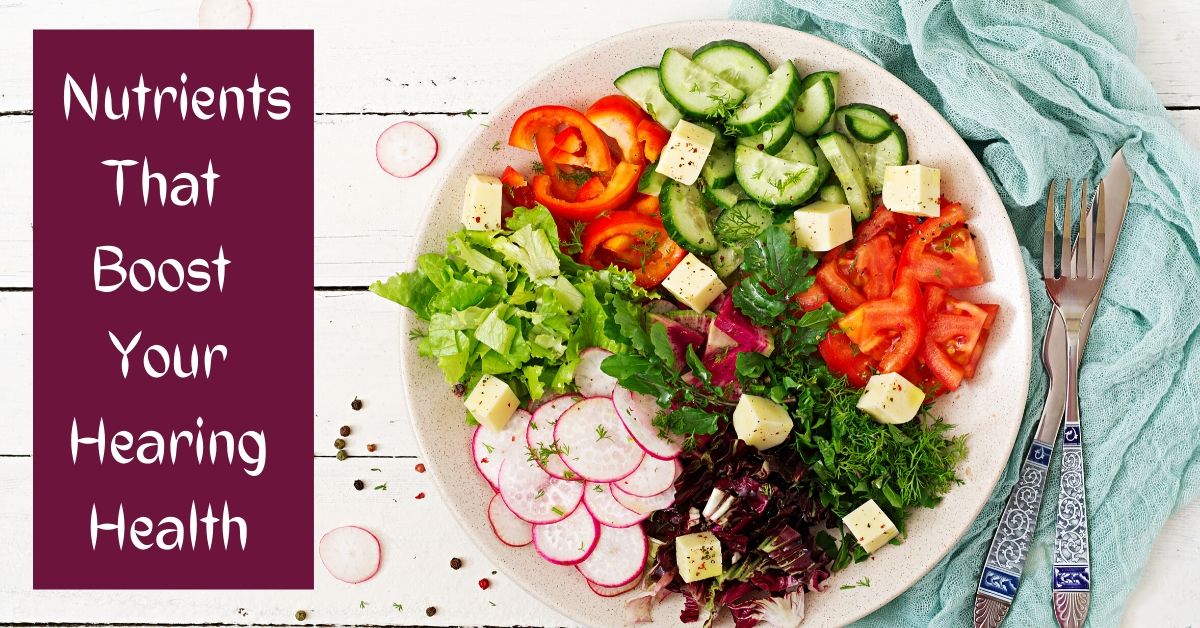- Common Hearing Aid Problems & How to Fix Them - June 14, 2021
- Why People Avoid Treating Hearing Loss — and Why You Should Schedule a Hearing Test! - May 21, 2021
- Common Hearing Aid Problems & How to Fix Them - May 14, 2021
Diet and exercise are both important for just about all functions of the human body, up to and including proper functioning of the 5 senses, as well as mental acuity. If we need proof of this, besides the many examples of healthy and energetic human beings who eat a proper diet and exercise regularly, we can look to the compartmentalized study of specific nutrients and their direct impact on various systems in the body. Here we will take a look at some of the nutrients that show evidence of being important specifically to hearing health.
Vitamins
Vitamins B-9 (folate) & B-12
Both of these B vitamins are associated with preservation of hearing into old age. According to a study from 1999, elderly women who had hearing loss had 48% less B-9 in their blood than those with adequate hearing. Two other studies found that sufficient levels of B-12 in the blood were associated with better hearing.
Both of these vitamins help keep homocysteine levels at bay. Increased levels of homocysteine are associated with restricted blood flow to the cochlea, the part of the ear where the mechanical energy of sound vibration is transduced (converted) to electrical energy. So making sure you get enough B-9 and B-12 helps prevent sensorineural hearing loss and age-related hearing loss by keeping the cochlea functioning properly.
Foods rich in vitamin B-9 include spinach, asparagus, broccoli, beans, liver, eggs and nuts. B-12 is found mostly in meat, fish, eggs and dairy. Vegetarians may have difficulty getting enough dietary B-12 and supplements are recommended especially for vegans.
Vitamins A & E
Vitamins A & E appear to be exceptionally significant for hearing health. In studies from 2011, those with diets high in vitamin A had a 47% lower risk of hearing loss, while those with diets high in vitamin E showed a 14% decrease in likelihood of hearing loss. For more vitamin A, consume more beef liver, eggs, butter from grass-fed cows, carrots, sweet potatoes, kale and spinach. Foods higher in vitamin E include almonds, avocados, olive oil, sunflower seeds, spinach, butternut squash and sweet potatoes.
Vitamin C
Vitamin C shows up on a lot of lists of “what is good for this-or-that body part.” This is because vitamin C, a water-soluble antioxidant, is an important component in many systems in the body. True to form, vitamin C has been shown to reduce levels of reactive oxygen metabolites in the inner ear, which can actually improve symptoms of sudden hearing loss. To get more vitamin C in your diet, add in more papayas, citrus fruits, strawberries, dark leafy greens, broccoli, bell peppers and Brussels sprouts. It used to be common knowledge to drink orange juice to get a surge of vitamin C, but the amount of sugar in juice is not good to overdo. Since vitamin C is water-soluble and difficult (though not impossible) to overdose, it is a decent candidate for supplements if you are afraid you’re not getting enough in your diet.
Minerals
Minerals are inorganic materials that the body still requires for various processes. Here are a few that are important to hearing health specifically:
Potassium
Potassium helps regulate fluid throughout the body. In our ears, this is especially important to the cochlea, which uses fluid as the final medium for the mechanical energy of sound vibration, where the cilia (tiny, hair-like cells) pick it up for transduction. Extremely important throughout the body, you can get more potassium from bananas, raisins, apricots, oranges, tomatoes, melons, lima beans, potatoes, spinach, yogurt and milk.
Magnesium
Magnesium may actually help protect the ears from extremely loud sounds by protecting the cilia from free radicals emitted when the ears encounter high noise levels. The Kresge Hearing Research Institute at the University of Michigan conducted studies that showed higher levels of magnesium and vitamins A, E, and C, in combination, led to less hearing loss from loud sounds. If you’re looking for more magnesium, turn to artichokes, bananas, spinach, tomatoes and broccoli.
Zinc
Zinc is great for the immune system, and can help ward off colds and their consequent ear infections. Studies suggest it may also help with tinnitus in those who have otherwise normal hearing. You can find zinc in beef, pork, dark meat poultry, nuts, lentils, split peas, oysters and dark chocolate.
The Take-Away: Eat Well
Whatever your health goals are, a varied diet of whole foods will be an important part of getting there. The vitamins and minerals discussed above are good for the ears and so much more. Eat right, exercise, protect your ears in noisy environments, and don’t forget to get your hearing tested at regular intervals.

